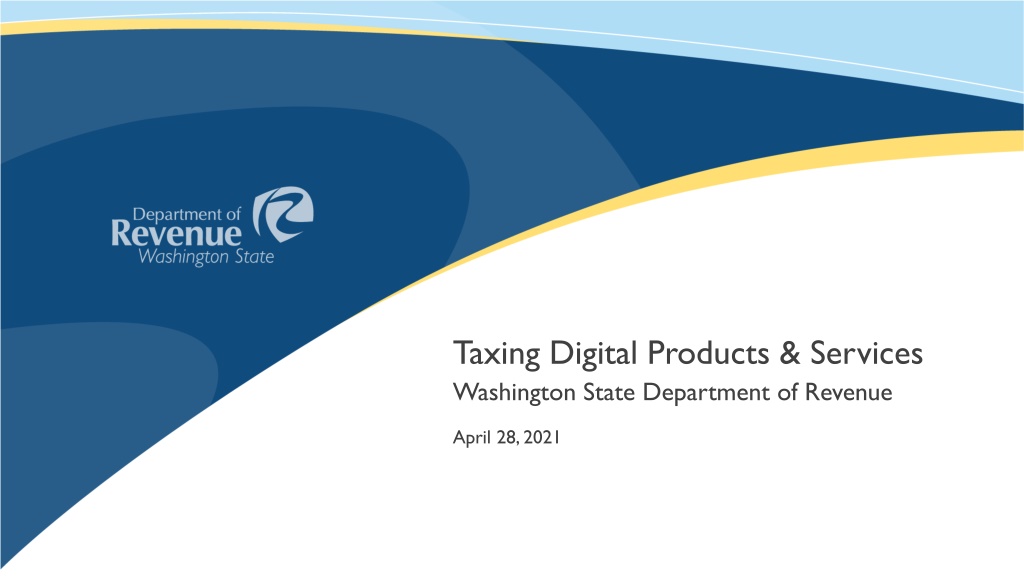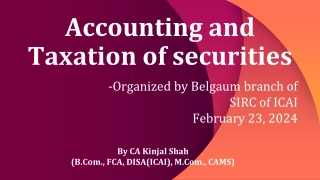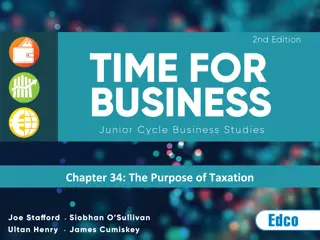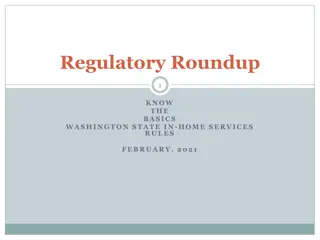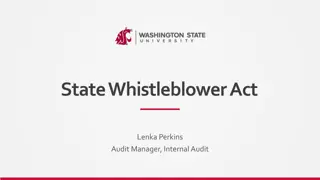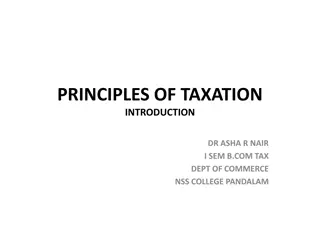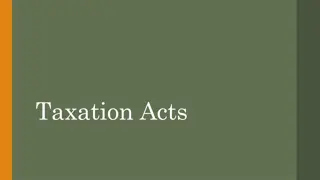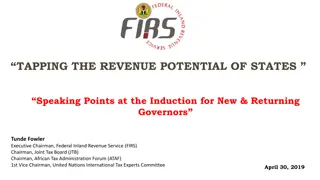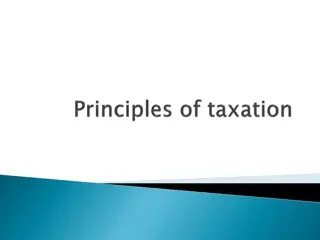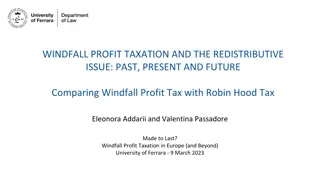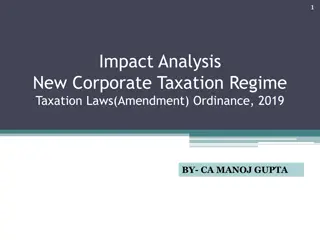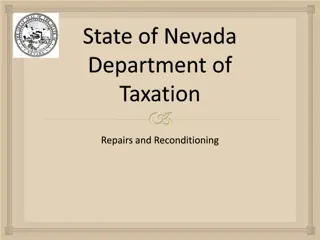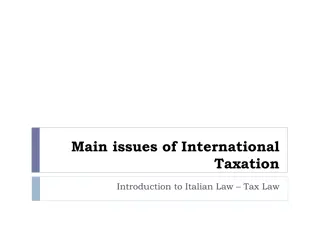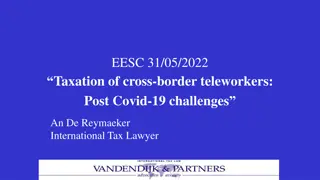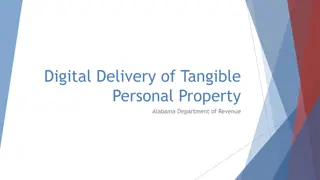Understanding Washington State's Taxation of Digital Products & Services
Explore how Washington State developed its digital tax law, the reasons behind it, the key choices made at a high level, and the categories of digital goods and services subject to taxation. Learn about the impact of the Wayfair decision and the challenges faced by states in taxing digital transactions.
Download Presentation

Please find below an Image/Link to download the presentation.
The content on the website is provided AS IS for your information and personal use only. It may not be sold, licensed, or shared on other websites without obtaining consent from the author. Download presentation by click this link. If you encounter any issues during the download, it is possible that the publisher has removed the file from their server.
E N D
Presentation Transcript
Taxing Digital Products & Services Washington State Department of Revenue April 28, 2021
Agenda History of why Washington developed the digital tax law Overview of Washington s digital tax law Special areas for administration Discussion with panel
All States Why Now? Nexus barriers lowered after Wayfair decision Possible erosion of tax base as transactions become digital Online sellers could get an advantage over main street merchants Old tax categories may not fit new transactions
Washingtons Reasons Increasing issues with: New products and services Ambiguity and controversy on taxation Legislature directed a study & committee (2007) Committee provided a report in 2008: Provided principles for legislation Washington also needed to comply with SSUTA
Washingtons Choices at a High Level Sourcing using the streamline model law (destination) Broad imposition on digitally supplied services Many specialized exclusions and exemptions Broad taxation of digital goods (broader than SSUTA) Also addressed prewritten software remotely accessed (i.e. not delivered)
The Categories Digital goods (DG) SSUTA books, music, video Also static data, facts, information and any combination Digital Automated Services (DAS) Any service transferred electronically using one or more software applications Broad imposition on digital services with many exclusions and exemptions Remote Access Software (RAS) Prewritten software not actually delivered (retail service) Different than the sale of prewritten software Digital codes (DC) Code representing a digital good or digital automated service
Comparing Terms & Categories Caveat: these terms take on different technical meanings depending on who is using them. SaaS (Software as a service) WA RAS or DAS IaaS (Infrastructure as a service) WA DAS PaaS (Platform as a service) WA DAS Prewritten software not delivered (no download or tangible media) WA RAS
Digital Automated Services Unpacked Unique cornerstone with broad taxation impact Any service transferred electronically that uses one or more software applications It taxes services Digital goods & software Additional features & functionality Must be transferred electronically Must include software Examples: Games, information services, etc.
Fitting it Together Digital Code (Represents) Prewritten Software Remote Access to Prewritten Software Digital Good Digital Automated Services Delivered digitally or TPP Books, music, video, data, facts, information Remotely accessed Something more bells & whistles Cloud Computing
Good Faith and Amnesty Phased Implementation Almost two (2) years for good faith reporting for DAS related Reasonable position based on available information Amnesty Digital goods were taxable but amnesty granted for past periods. Digital automated services were always subject to service & other B&O and there is no amnesty for that (this is a default B&O category)
Driving Administration Exemptions A digital product exempt from sales and use tax but still owes retailing B&O tax Exclusions Excluded as a digital product, but subject to another B&O classification Classification Which digital product are you? Some exemptions/exclusions only apply to a digital goods, etc.
Exemptions Specific Stakeholder Interests Financial Transactions ATM, wire services Gambling Storage and web hosting Utilities and Federal Government Expectations of industries Marketplace facilitators, advertising & data processing Other Related Services Telecom & internet, RAS
Exemptions Good Tax Policy Making websites sticky Given away free Parity with TPP exemptions Resale ITFA and discrimination Internet access TPP vs specific to digital Education related Business use inputs and pyramiding Solely business purpose Fairness and sourcing MPU
Intersection of Software & Professional Services Issue: hybrid services involving professional services and software based automation This something that every state will have to address Bright lines All taxable if some digital service All exempt if some professional service What is the service being sold Tool used by professional or true hybrid Objective test based on data has been hard to administer Alternatives? True object or primary purpose?
Taxing Related Services Services sold exclusively in connection with a digital product Separately stated does not matter Typical: implementation Similar to sales price definition Avoids bundling analysis
Sourcing Digital products use the sourcing hierarchy in SSUTA rule Cascading hierarchy Issues Collecting necessary data from provider
Trends Movement toward holistic solutions and consolidation. Exclusions becoming obsolete drive controversy. Data processing Advertising Disappearance of pure remote access to prewritten software. Compliance Wayfair has spurred interest along with marketplace fairness and tax discovery efforts. The legislation has grown our tax base and it continues to grow.
Summary WA Decision Revenue erosion, business impact, fairness, ambiguity, changes in economy WA Planning and drafting legislation Partnering and buy-in from taxpayers WA Implementation Broad imposition versus enumerated categories Amnesty and phased implementation Exemptions Sourcing
Reference Material Legislation in 2009 (ESHB 2075) & 2010 (SHB 2620) Washington Admin Code 458-20-15503 Study of the Taxation of Electronically Delivered Products Contacts Matt Largent MatthewL@dor.wa.gov Katie Koontz KatieKo@dor.wa.gov Click image to open report
